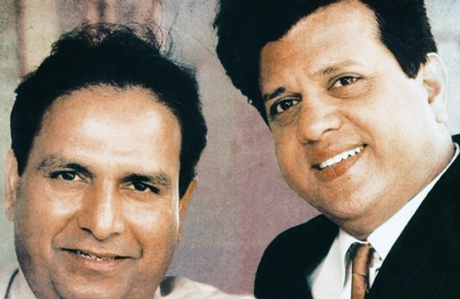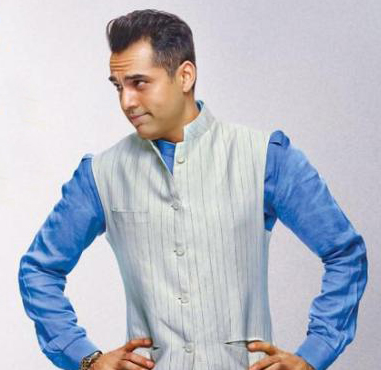Bollywood Masala Mix

By Sonal Pandya
Music composer Bhagatram and younger brother Husnlal became Hindi cinema's first music-director duo. After them, such pairings became common, with some like Shankar-Jaikishan, Kalyanji-Anandji and Laxmikant-Pyarelal rising to the very top of their profession. Husnlal and Bhagatram even trained the next generation of music composers with Shankar and Khayyam as well as the singer Mahendra Kapoor starting out with them.
Bhagatram's date of birth is unrecorded, but it is widely believed that he was born in 1914 in the small Punjabi village of Khama in Jalandhar district. The brothers received their initial training from the classical musician, Pandit Dilip Chandra Vedi. They had a musical connection in an older cousin, Pandit Amarnath, who composed music for films made in Lahore. It was on DM Pancholi's film Dassi (1944) that they assisted Pandit Amarnath.
Bhagatram, who was an expert harmonium player, scored music independently for smaller films like K Amarnath's Midnight Mail (1939), Nanubhai Vakil's Hatimtai Ki Beti (1940) and AM Khan's Hamara Desh (1940).
But his big opportunity came as a duo with his younger brother with Prabhat Studios' Chand (1944). There was a lot riding on this film as the illustrious V Shantaram had parted ways with Prabhat to set up his own Rajkamal Kalamandir in Bombay. The remaining partners, Damle and Fatehlal, wanted Chand's soundtrack to stand out.
They need not have worried. The music of Chand (1944), directed by DD Kashyap, was a hit with songs like 'Aye Chand Bata Mujhko', the duet sung by GM Durrani and Zeenat Begum, and the solos by Manju, 'Do Dilon Ko Yeh Duniya', and by Sitara, 'Chupke Chupke Mere Dil Mein'.
The success of this soundtrack led to another film with Prabhat, which, incidentally, was Dev Anand's first film, Hum Ek Hain (1946), directed by PL Santoshi and co-starring Durga Khote, Rehman and Rehana.
The duo continued its stellar work, imbuing their music with their unique Punjabi touch, in films like Nargis (1946), Mirza Sahiban (1947), for which they finished the work of their late cousin Amarnath, and Heera (1947). In 1948, they composed the song 'Suno Suno Aye Duniyawalo Bapu Ki Yeh Amar Kahani' written by lyricist Rajinder Krishan after the assassination of Mahatma Gandhi. The tribute was recognized around the country.
The films for which Husnlal-Bhagatram are most known are Famous Pictures' Pyar Ki Jeet (1948) with songs like 'Oh Door Jaanewale Waada Na Bhool Jaana' sung by Suraiya and Bari Bahen (1949) with solos from Lata Mangeshkar in 'Chale Jaana Nahin' and Mohammad Rafi in 'Mohabbat Ke Dhoke Mein Koi Na Aaye'.
They continued working in Hindi and Punjabi cinema until the 1960s when they broke up and went their separate ways.
Husnlal took up performing and teaching classical music in Punjab and Delhi while Bhagatram stayed back in Bombay to play in the orchestras of other music composers.
In 1968, Husnlal died while out on his morning walk. The death of his younger brother hit Bhagatram hard. He died a few years later on 29 November 1973 at the age of 59. His son, Ashok Sharma, also chose a musical career; he is a noted sitar player and has worked with music composers like RD Burman and Rajesh Roshan.

In the golden days of Bollywood, aspiring writers descended on the city that was then Bombay from all nooks of India’s hinterland, spouting pristine Urdu or immaculate Hindi, living in dingy tenements in the northern suburbs of Yari Road or Malad and struggling to make ends meet. The producers were king, and the dime-a-dozen writers struggled.
But now, the advent of streaming services hungry for a slice of the Indian film industry pie has turned the tables. If you have the talent to write a story and the edge to lend it the necessary nuance, you are a prized part of the industry.
It’s a welcome twist in which the producer, for a change, is hungrier than the writer. Why is it happening? Because a term that has been rather casually tossed around this decade is now king: content.
Some see it as a fad, but many see this moment as a seismic change in Bollywood’s topography and history – a phase in which the Indian film industry is becoming more conscious and respectful of the creative process in the hope of making more meaningful cinema for an increasingly fickle audience spoilt for choice on their smartphones and tablets.
But then, a more sophisticated variant of the producer is now also emerging, hoping to seize the opportunity of the shifting canvas that is Bollywood. Abhay Deol is Bollywood aristocracy – the nephew of superstar Dharmendra, the face of some of India’s biggest blockbusters in the 1970s.
As an actor, Deol has become a trailblazer for Indian indie cinema over the past decade, but as beloved as he was, he proved to be too much of an outsider in the Hindi film industry despite his family’s insider status.
It’s not that the acting offers dried up. They just became boring or inconsequential. So the poster boy of Indian indie cinema pivoted – and became an indie producer instead. “It was inevitable. I did not chase the mainstream, I was on the lookout for fresh ideas and it helped that I was from an established film family [but it also meant] being mainstream was expected of me.
"But fresh ideas come only with fresh talent … the old guard was too comfortable in their space as they were already successful and sat on top of the food chain,” he says. “I ended up making all my first five films with debut directors and I continued to work with directors who were at best one film old for the next five films.
“So I was surrounded by young minds and all the idealism and inexperience that comes with it.”
The producer recently starred in The Odds, a coming-of-age drama series that received rave reviews after an extract of it was shown at the 17th Indian Film Festival of Los Angeles on April 14.
Similarly, for Siddharth Roy Kapur, the former managing director of Disney India and now head of his own independent studio, the decision to branch out of the corporate space came from the urge to reconnect to the new realities of Indian cinema.
After producing some of the most genre-defining films of the last two decades for UTV Pictures (which then morphed into Disney India), Kapur chose to branch out on his own in 2017. To develop a rapport with cutting-edge writers, he kick-started his innings as an independent producer with a masterclass for select writers by Chris Brancato, creator of the internationally acclaimed web series Narcos.
“Streaming platforms have made it possible to tell stories that can no longer be told on the big screen. The theatrical experience today has to offer either a ‘cinematic spectacle’ or ‘high concept’ for audiences to make the effort to drag themselves from their TV screens or smartphones to a cinema hall,” says Kapur of the new Bollywood order.
“Streaming platforms provide the opportunity for creators to tell character-driven stories that build over multiple hours, to tell layered narratives and to explore uncharted territory without being subjected to arbitrary censorship. This makes it a very attractive proposition for writers, directors and producers. A producer today can see himself as purely a content creator and enabler, and build a production schedule that is agnostic to duration, genre, mode of distribution and the necessity for a star cast to justify a budget.”
Nestled somewhere between indie maverick (Deol) and media mogul (Kapur) is the feisty and sassy Shreya Vaidya, 26, a writer working out of Oshiwara, a neighbourhood in northern Mumbai, which almost all of India’s aspiring actors descend upon to be “discovered”. Vaidya recently wrote the quirky web series Closeted Comic, which is split into eight zany, four-minute episodes.
A graduate in media ventures from Boston University, she returned to India two years ago after stints in New York and Los Angeles. She says she found “liberation” with the online format as a filmmaker.
“There are zero middlemen, and that can be very liberating. I’ve never restricted myself to the online format, but it did serve my initial purpose,” she says. “I was set on doing something different and I wanted to push myself beyond just writing scripts. Luckily, a few of my friends were also experiencing a creative rut and I took full advantage of the situation.
“Closeted Comic came out of that. It was an experimental web series that my friends and I made in five days. We shot it on an iPhone and distributed it straight to YouTube. It didn’t need anyone’s final approval. I was just happy to be able to exercise full control and do it so easily.” Vaidya is now writing two web series for top streaming operators.
As Bollywood takes into account the shifting landscape of the media industry, and as outsiders break the barriers that previously forbade them entry, the texture of Indian cinema is changing. And most see it as a breath of fresh air after years of embarrassing dates at multiplexes.
Maple Ridge's Biju Matthew is a psychiatrist, clinical professor and author of the wildly popular book, 'Super 30: Changing the World 30 Students at a Time,' which chronicles the inspirational story of Indian Anand Kumar – a mathematician committed to educating poor Indian youth who are gifted in math.
After meeting in 2012, Matthew was driven to write the book and highlight the various adversities that Kumar endured during his life growing up in the slums of India.
"I was very impressed with his background ... I got a hold of him and talked to him ... that was the start of a long journey," Matthew said.
Matthew began writing the book, made multiple trips to India and interviewed several people who had successfully done the program.
Kumar established Super 30 in 2002. The school graduates 30 underprivileged students a year and prepares them for the prestigious Indian Institute of Technology entrance exam, which is equivalent to the MIT exam.
"He has got a unique way of teaching, for example, while solving a problem he doesn't give just one answer. He encourages kids to come up with five different solutions or more," said Matthew.
The program also encourages the kids to ask Kumar questions at any point during the day and provides free food, and lodging for a year.
The Bollywood version of Super 30, directed by Vikas Bahl is out July 12th.
Although Matthew was not directly involved in the adaptation to film, he said he's taking delight that the movie will teach an even wider audience about Kumar's teachings.
"I can't believe this is happening to me… you know I read all these,reviews, articles and newspaper clippings on a daily basis and enjoy," he said.